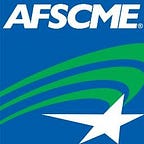Public Employers Must Address Harassment Too
#MeToo has injected a new urgency in the battle to end sexual harassment once and for all
By Lee Saunders and Elissa McBride
The #MeToo movement has challenged our nation to confront pervasive sexual harassment in the workplace. Women of every age, every background and every profession have faced harassment, and for too many perpetrators there has been no accountability. According to a study conducted by the nonprofit Stop Street Harassment, 81 percent of women (and 43 percent of men) report experiencing sexual harassment or assault.
Whether you work at a big corporation, a mom-and-pop business, a nonprofit dedicated to making the world a better place, or — like the 1.6 million members of AFSCME — in public service, it is the responsibility of management to ensure the dignity of every employee. That means taking complaints seriously, delivering real consequences to those responsible, and implementing policies to stop harassment before it begins.
AFSCME members are the people who keep your community running. We keep the streets clean and safe. We drive your kids to school. We’re nurses and librarians, road crews and home care workers. People in public service answer a calling to put their communities first, and they deserve a workplace free of harassment.
Unions have long worked with employers on policies to address harassment directed at workers. In just one example, management at telecom giant Verizon worked with members of the Communications Workers of America and the International Brotherhood of Electrical Workers to create a joint labor-management harassment awareness program that empowered workers to speak out about gender-based violence. Public sector employers, our state and local governments, need to take similar steps.
In Minnesota, after harassment claims led to the resignation of two state legislators, the state House and Senate are looking at new policies to reduce harassment in the legislature. But the focus cannot be so narrow. New polices must not be limited to legislative staff, but must extend to employees in public service throughout the state. All people who work to make their communities stronger should be able to do their jobs without the fear of being harassed. And anyone who does suffer harassment should know that reports will be handled professionally and without retribution.
Our cities, states and federal agencies should set the highest possible standard. After all, the mission of government is to ensure life, liberty and the pursuit of happiness for everyone. We cannot fulfill that promise without creating and maintaining harassment-free workplaces for public employees.
The U.S. Equal Employment Opportunity Commission has a checklist to help employers develop comprehensive harassment policies that allow their workers to feel safe at work. Employees can use this checklist as a guide to ensure that the policies at their workplace are sufficient. And union members can and should use it during negotiations to ensure that their contracts include strong anti-harassment terms, and that they can turn to the union if management does not protect them.
As leaders of AFSCME, we are also employers of our union’s hardworking staff. We are proud of our longstanding policy to protect our employees from harassment, and we are using this moment as an opportunity to strengthen it.
We are grateful to the brave voices that have awoken our collective conscience to this epidemic. Workplace sexual harassment is not new, but #MeToo has injected a new urgency in the battle to end it once and for all. All workers deserve protection, and America’s union members will continue to lead the way.
Lee Saunders is president of the American Federation of State, County, and Municipal Employees, a union of 1.6 million workers and retirees in public service. Elissa McBride is the secretary-treasurer of AFSCME.
